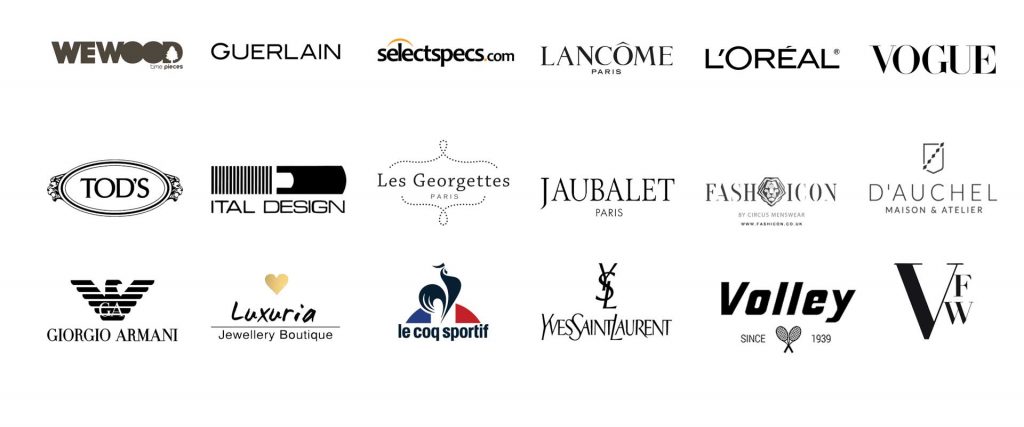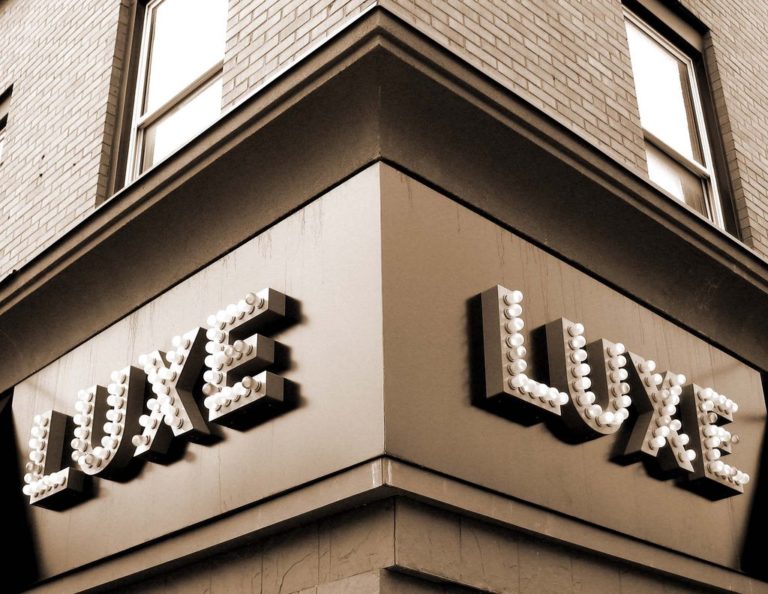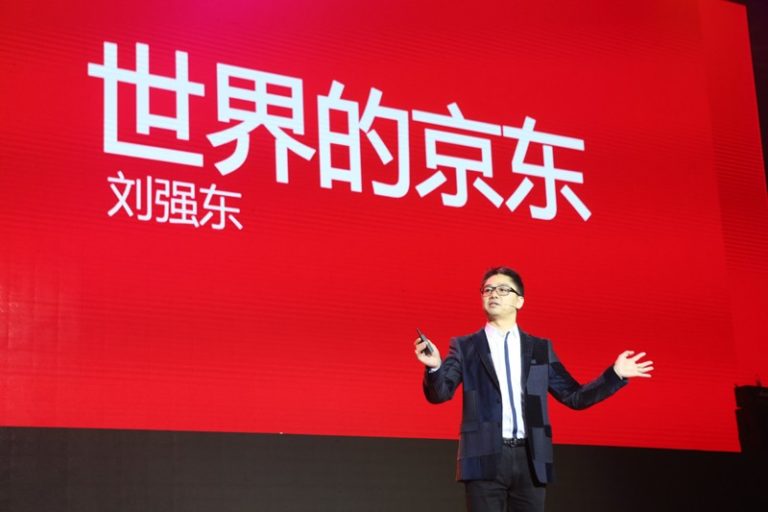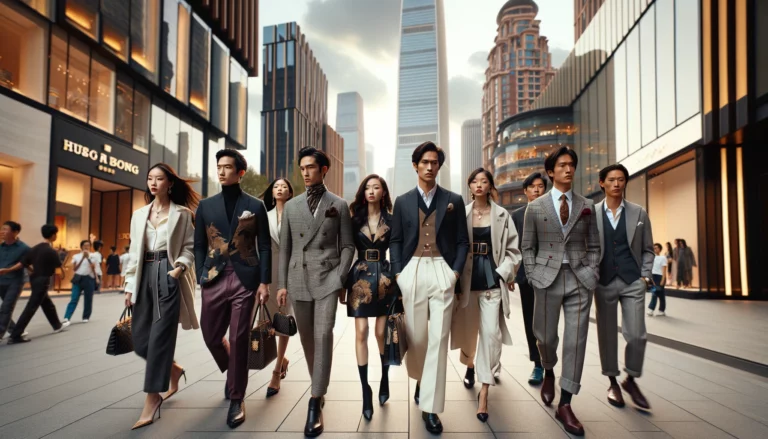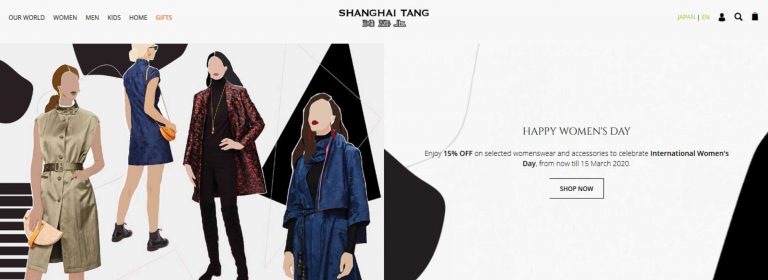China Luxury Market: Is There Still Space for Newcomers?
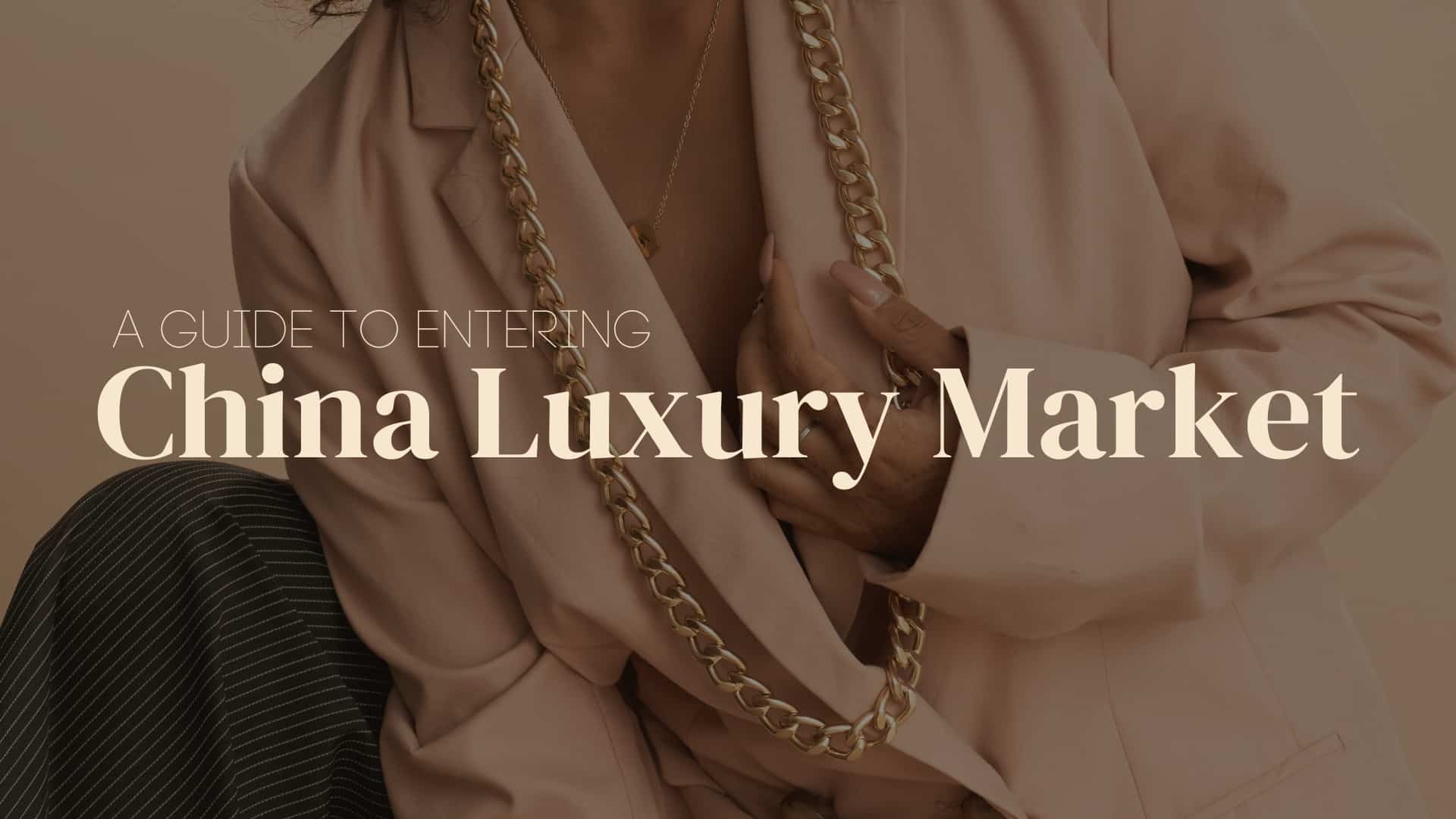
China’s luxury market is a force to be reckoned with. With Chinese consumers predicted to spend $7188 billion on luxury goods in 2025, China has become the world’s second-largest personal luxury goods market and the most prominent in APAC. As such, entering this market can mean significant growth opportunities for luxury brands.
In this blog post, we will explore consumer behavior and preferences, the latest trends and major players, as well as effective marketing tactics that can help you succeed in this lucrative but challenging arena. Read on to learn more!
Cost-Effective Agency
KPI and Results focused. We are the most visible Marketing Agency for China. Not because of huge spending but because of our SMART Strategies. Let us help you with: E-Commerce, Search Engine Optimization, Advertising, Weibo, WeChat, WeChat Store & PR.
2024 updates
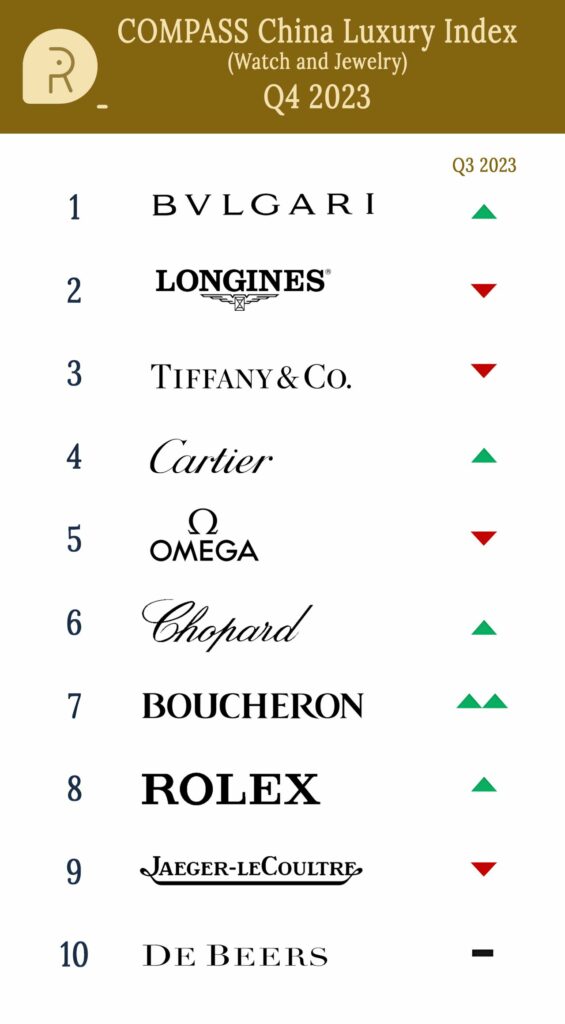
China Luxury Market Overview
The Chinese luxury market has experienced significant growth in recent years, reaching a staggering $118 billion in 2018 and on the way to reaching $188 billion in 2025. This impressive growth is driven by various factors such as the rising middle class and their increasing disposable income, eagerness to purchase high-end goods, and rapid urbanization.
With its 14% year-over-year increase from the previous year, it’s evident that China’s luxury market offers immense potential for brands seeking a share of this lucrative industry.
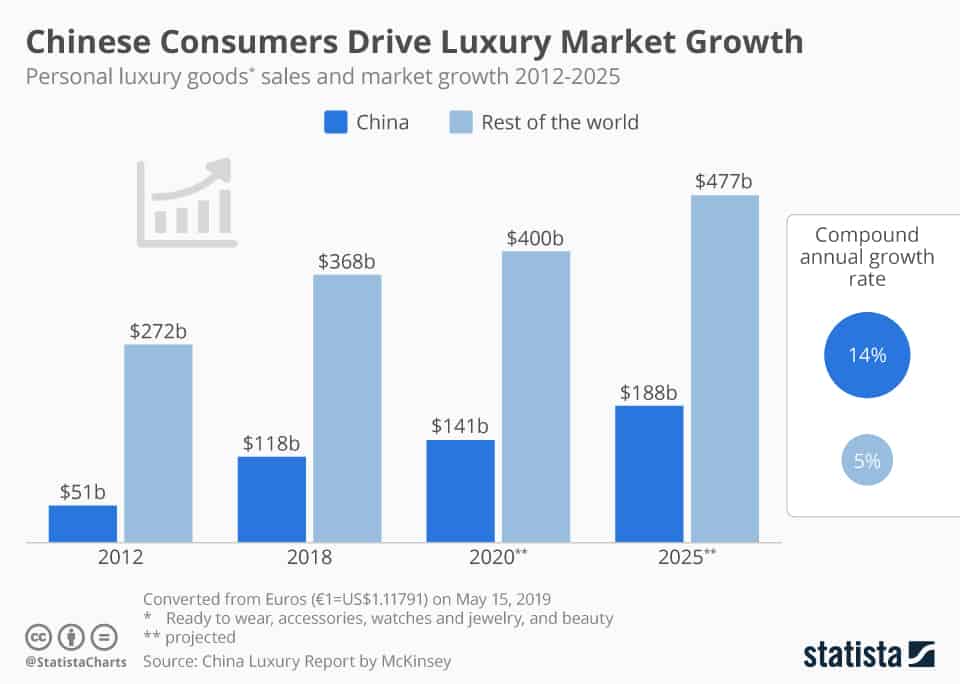
With affluent consumers driving the global luxury market, China has emerged as a critical battleground where established and emerging players vie for supremacy. According to McKinsey, this powerhouse economy is poised to contribute an astounding 41% of global luxury consumption by 2025.
Furthermore, despite the economic turmoil caused by the pandemic, domestic sales of personal luxury goods in China surged by an impressive 48% in 2020 – highlighting both resilience and robust demand.
Consumer Behavior And Preferences
Chinese consumers place a strong focus on fashion and jewelry over other luxury products such as leather goods or bags. They view luxury as a way of achieving social advancement and self-differentiation.
As China’s middle class continues to expand, the opportunity for luxury brands is rapidly growing. An estimated 75% of Chinese consumers are expected to have access to and be able to purchase luxurious products by 2030 – creating a massive influx of potential buyers in this market. But which groups are the biggest drivers of luxury sales?
Millennials should be the core of your targeting
Millennials are the future of luxury spending, with an estimated 40% share expected in 2024. This powerful consumer segment includes more than 350 million Chinese shoppers who seek fashion and jewelry items – yet also help elevate many other industries simultaneously.
Among them is baby products; experts suggest that this group will be a major factor in driving luxury purchases within the infant market in Mainland China – bringing promising opportunities to all companies selling toys, skincare supplies, and premium goods geared towards kids.
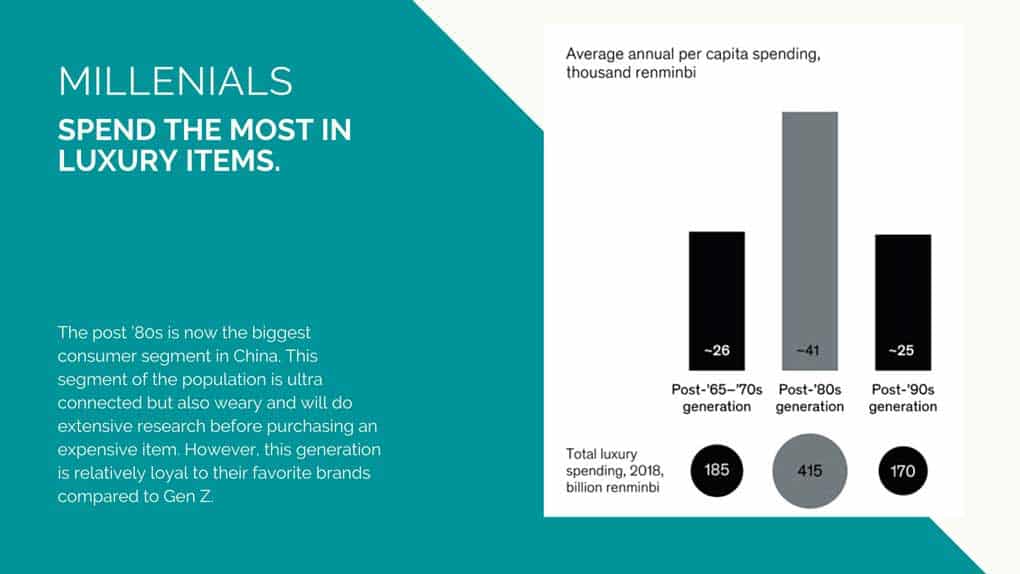
For young Chinese luxury shoppers, brand identity and craftsmanship are the most important characteristics associated with high-end goods. Rising households in China are driving growth for luxury brands, especially those targeting younger customers who value unique experiences and exclusivity from their purchases.
Gen Z is the most promising generation when it comes to luxury goods
Generation Z stands out for their trend-focused and quality-driven shopping habits – they care less about logos or names, opting instead to seek experiences. Luxury brands must become familiar with the likes of Douyin and Xiaohongshu if they want to win over this demographic – an especially important task considering McKinsey predicts Gen Z will contribute 20% more spending in China by 2030!
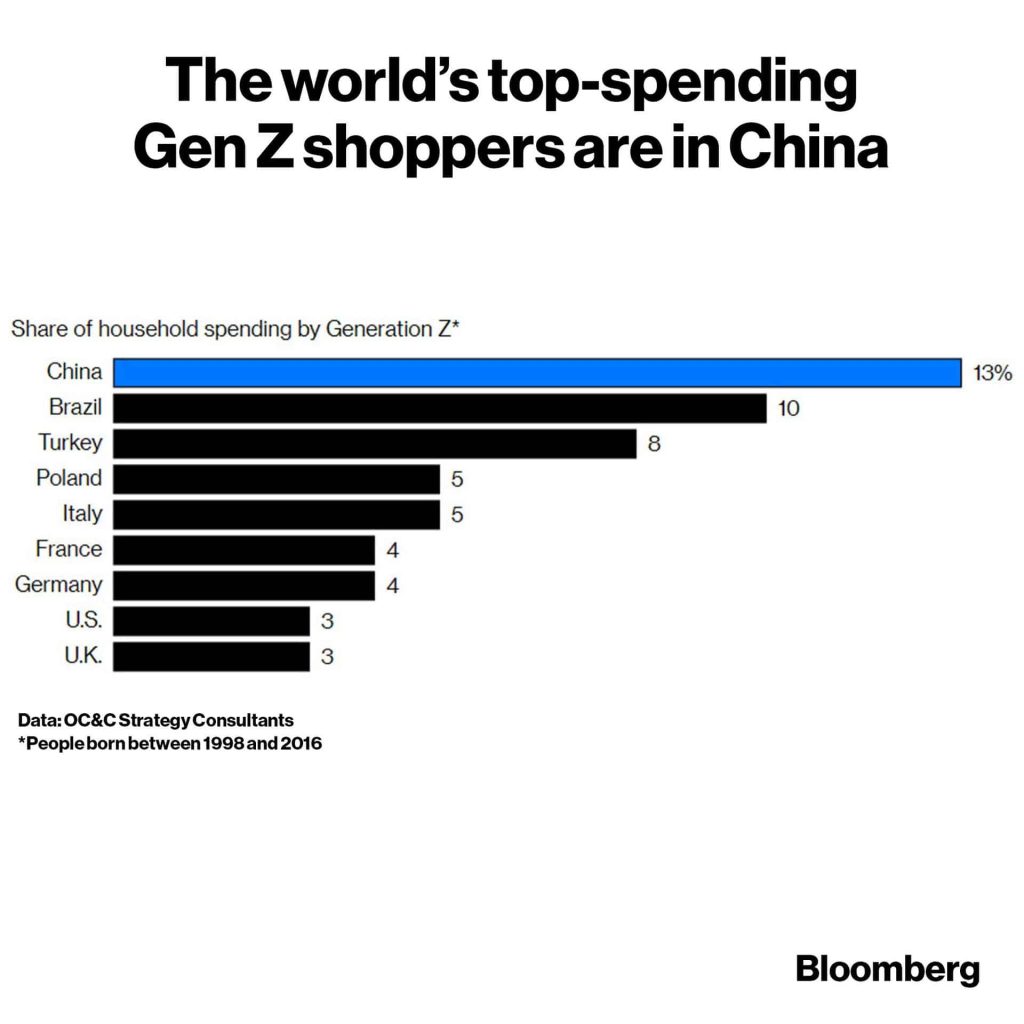
Latest Trends In The Chinese Luxury Market
Here are some of the recent trends in the luxury sector, driving the growth rate since at least 2021, 2022, and 2023:
- Digitalization: More luxury brands are embracing digital marketing channels to reach Chinese consumers, who are increasingly turning to e-commerce platforms for their online luxury purchases.
- Sustainability: Chinese luxury consumers are becoming more environmentally conscious and are looking for sustainable products and practices from luxury companies.
- Hybrid models: As the line between online and offline shopping continues to blur, luxury brands are adopting hybrid models that provide a seamless shopping experience across both channels to stimulate growth in China.
- Customization: Consumers of luxury in China are looking for personalized experiences and unique products that reflect their individuality.
- Shift towards fashion and jewelry: According to recent surveys, fashion and jewelry have overtaken leather goods as the preferred category among Chinese luxury consumers.
- Cross-border collaboration: Luxury brands are partnering with local designers or artists to create limited-edition collections that appeal specifically to Chinese tastes.
Overall, these trends highlight the need for luxury brands to stay relevant by adapting to changing consumer behavior, preferences, and expectations in the Chinese market, especially in luxury e-commerce.
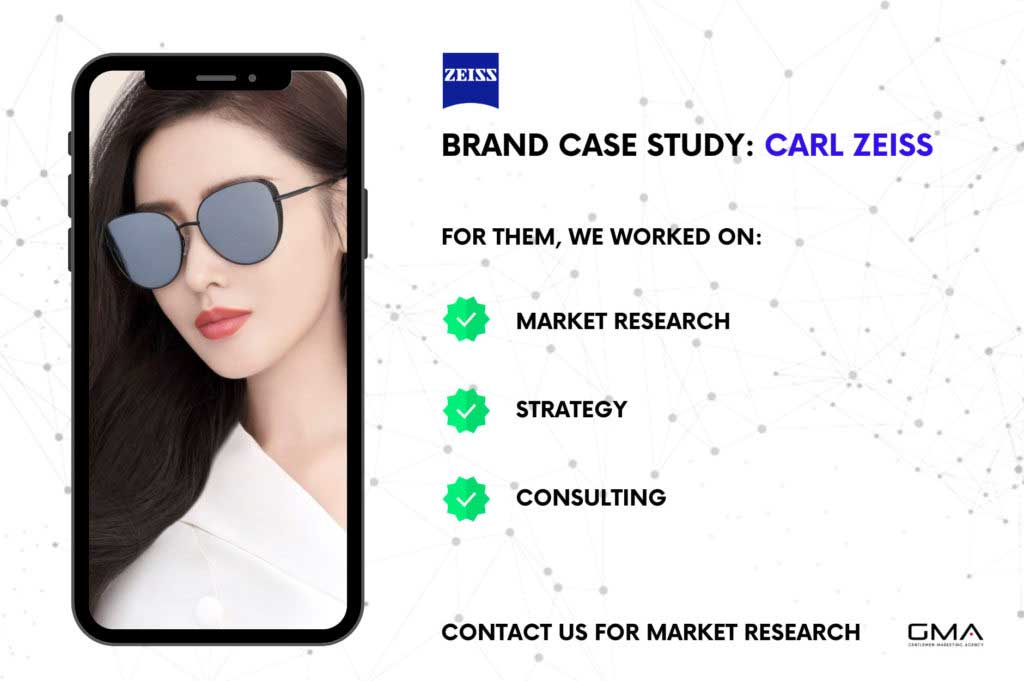
Major Players In The Chinese Luxury Market
China’s luxury market is dominated by renowned international brands that continue to make their presence felt by Chinese consumers. Let’s take a look at the major players in various sectors of the luxury market in the country. Here are some of the biggest luxury brands in China, divided by categories:
| Category | Major Players |
|---|---|
| Fashion and Apparel | Chanel, Hermès, Gucci, Dior, and Louis Vuitton |
| Beauty and Personal Care | Estée Lauder, L’Oréal, SK-II, and La Mer |
| Watches and Jewelry | Rolex, Cartier, Tiffany & Co., and Bulgari |
| Automobiles and Transportation | Rolls-Royce, Ferrari, Lamborghini, and Bentley |
| Food and Beverages | Hennessy, Remy Martin, Moët & Chandon, and Dom Pérignon |
| Hospitality and Travel | The Ritz-Carlton, Four Seasons Hotels and Resorts, Aman Resorts, and Rosewood Hotels & Resorts |
These major players have secured their positions in the Chinese luxury market by creating strong brand images and consistently delivering unparalleled quality and service. In order to maintain their market share and strong growth each year, they constantly adapt to the evolving preferences and expectations of Chinese consumers.
Douyin, perfect Social media for new comers in China 2024
Douyin, China’s short-video platform like Tiktok, has emerged as a Massive engagemnt tool for new brands looking to make a splash in the Chinese market.
Formerly known as TikTok outside China, Douyin offers a unique and dynamic platform that allows brands to engage with a massive audience, showcase their products or services, and build a strong online presence. In this article, we will explore why Douyin is the perfect platform for new brands in China and how it can help them succeed in a competitive marketplace.
- Massive User Base and EngagementDouyin boasts over 600 million daily active users, making it one of the largest social media platforms in China. The platform’s users are highly engaged, spending an average of 60 minutes per day browsing and creating content. This level of engagement provides new brands with an opportunity to reach a vast and attentive audience.
- User-Generated Content (UGC) and ViralityOne of Douyin’s defining features is its emphasis on user-generated content. Users can easily create and share short videos, incorporating music, filters, and special effects. Brands can tap into this creativity by encouraging user-generated content related to their products or services. Viral challenges and trends on Douyin can quickly catapult a brand to stardom, increasing brand awareness and user engagement.
- Precise Targeting and Data AnalyticsDouyin’s parent company, ByteDance, has invested heavily in data analytics and AI algorithms, allowing brands to precisely target their desired audience. Brands can leverage the platform’s vast user data to create custom audiences, ensuring that their content reaches the right people at the right time. This level of targeting can significantly improve the return on investment for advertising campaigns.
- E-commerce IntegrationDouyin has seamlessly integrated e-commerce features, enabling brands to sell products directly through the platform. With shopping tags and links embedded in videos, users can make purchases without leaving the app. This feature simplifies the customer journey and increases conversion rates for new brands.
- Influencer Marketing and Brand CollaborationsDouyin is home to a thriving ecosystem of influencers and content creators who can help new brands promote their products. Collaborating with popular Douyin creators can quickly boost a brand’s visibility and credibility. Influencer marketing campaigns on Douyin are known for their effectiveness in reaching a wide and engaged audience.
- Localized Content and Cultural RelevanceDouyin allows brands to create content that resonates with Chinese culture and trends. Understanding the local context and tailoring content accordingly is crucial for building a strong brand presence in China. Douyin provides the tools and insights necessary to navigate the cultural landscape effectively.
Different Sectors Of The Chinese Luxury Market
The Chinese luxury market is divided into various sectors, including fashion and apparel, beauty and personal care, watches and jewelry, automobiles and transportation, food and beverages, hospitality, and travel.
Fashion And Luxury accessories
In the Chinese luxury market, fashion and apparel remain one of the most significant sectors. The fashion industry in China experienced explosive growth over the past decade due to rising disposable incomes, celebrity influence, and changing consumer behavior.
Young Chinese consumers are heavily influenced by KOLs and celebrities such as Angelababy, Yang Mi, and Tiffany Tang in the fashion industry.
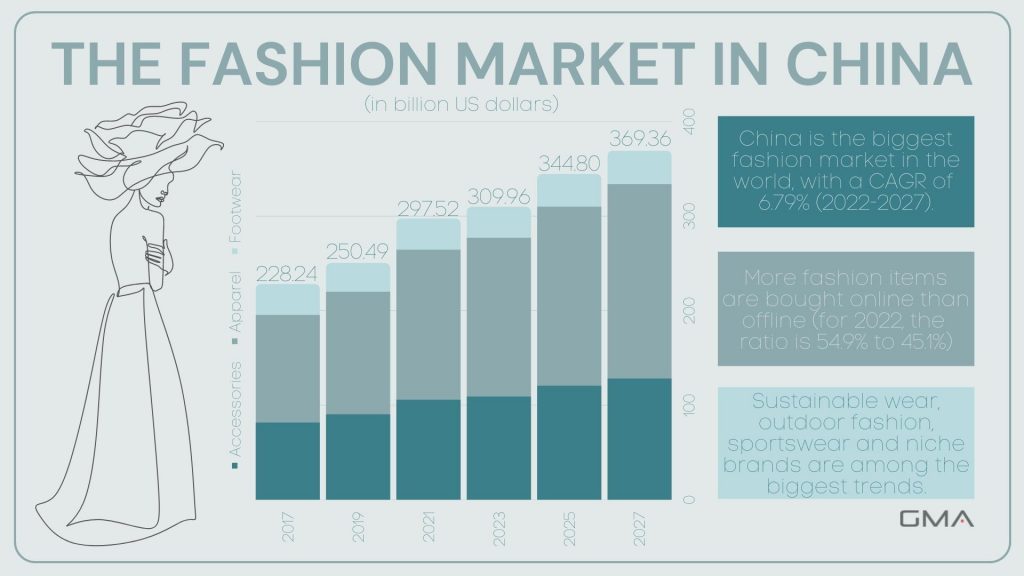
In terms of luxury brands’ popularity in China’s fashion industry trends, Louis Vuitton remains a top choice among aspirational buyers since its introduction back in 1992.
Gucci is also gaining momentum among younger consumers thanks to its rejuvenated style under creative director Alessandro Michele. Chanel consistently ranks among the top three most desired luxury brands in China for many years along with Dior being popular due to its timeless aesthetic styles.
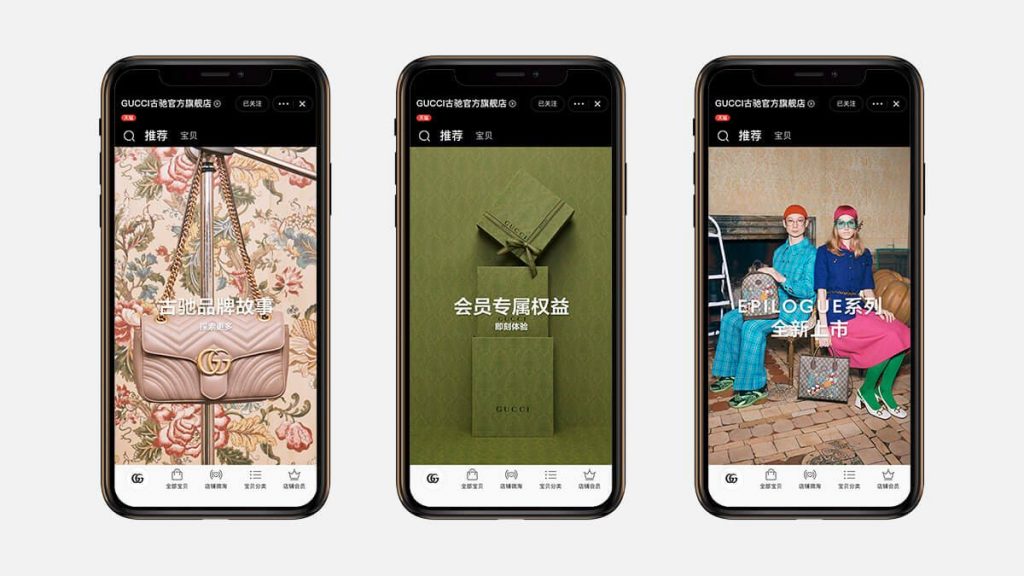
Beauty And Personal Care
As the largest sector of China’s luxury market, beauty, and personal care have become a significant focus for global luxury goods. Chinese consumers aged 30-35 are the biggest spenders in this sector due to their high purchasing power.
However, it is important to note that new luxury consumers can be divided into two groups: status surfers who prioritize quality over brand loyalty and newcomers who value both.
Digital innovation also plays a role in advertising beauty and personal care products in China’s luxury market with AR makeup apps becoming more popular among young female buyers.
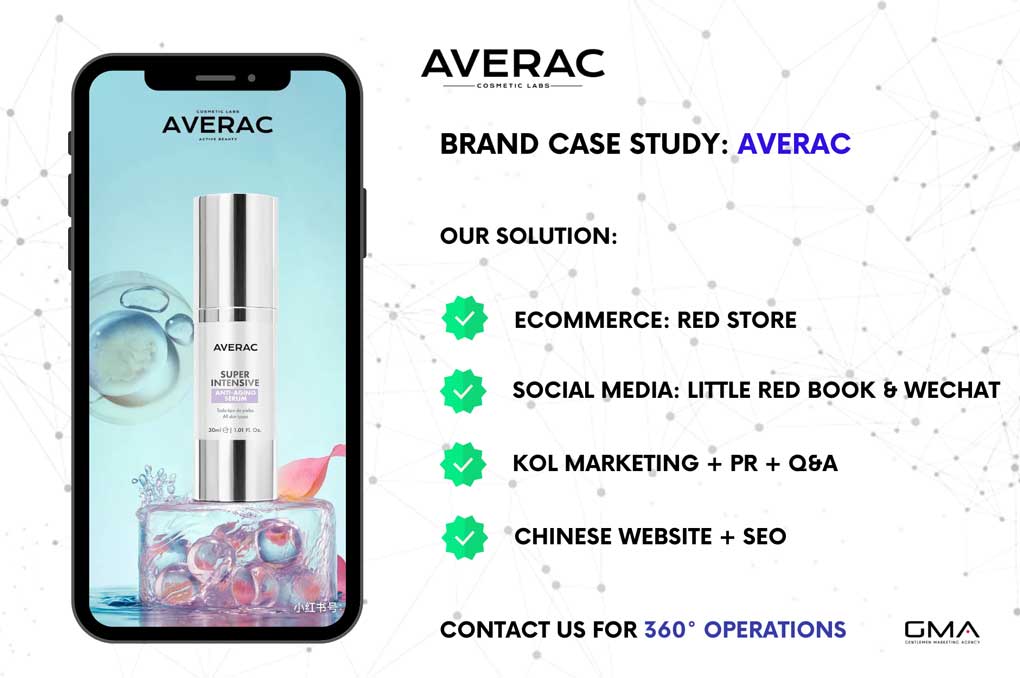
Watches And Jewelry
One of the most sought-after sectors in the Chinese luxury market is watches and jewelry. Designer pieces from top brands such as Cartier, Patek Philippe, and Rolex are highly coveted by Chinese consumers who seek to display their wealth and status through these luxurious accessories.
According to research, luxury consumers in China are more likely to purchase watches and jewelry than leather goods or bags. Jewelry holds particular significance in Chinese culture as it represents family ties, good fortune, and social status.
As such, many affluent consumers view buying designer jewelry as an investment rather than just a simple purchase.
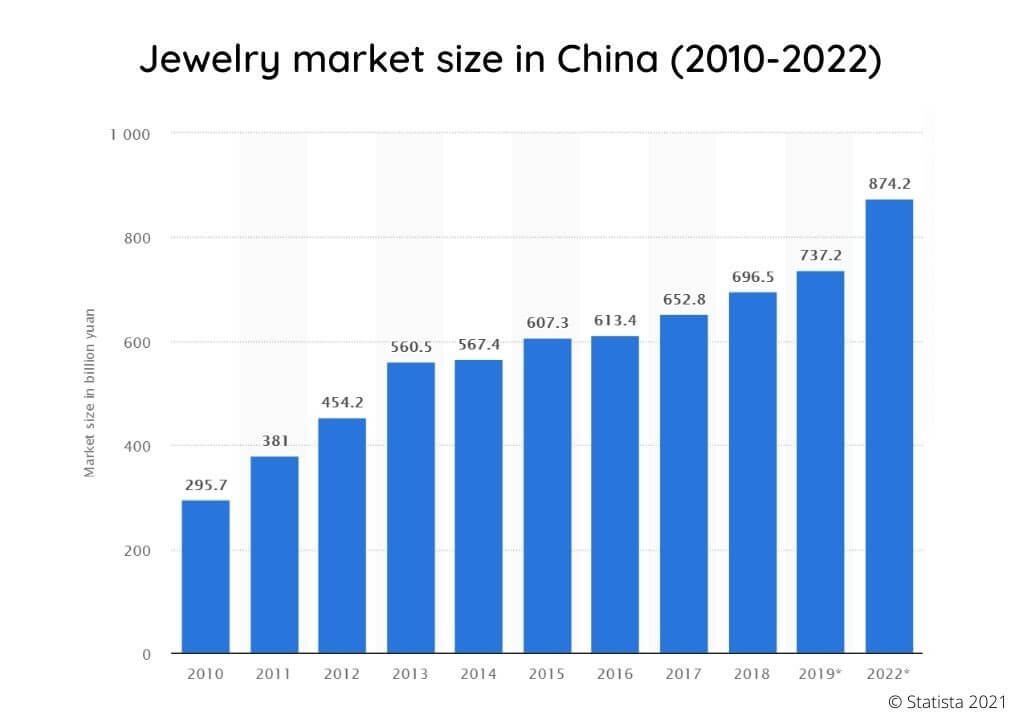
Food And Beverages
China’s growing middle class with rising disposable income has led to increased demand for high-end dining experiences and exquisite culinary offerings.
Fine dining culture in China is on the rise, with a preference for gourmet food and beverage options from elite international brands. The premium alcohol market in China is also expanding rapidly, as consumers are willing to pay top dollar for exclusive wines and spirits.
Luxury food events such as gourmet festivals have become increasingly popular amongst affluent consumers looking for new gastronomical experiences. These exclusive culinary events bring together exceptional chefs from around the world who present their signature dishes in creative settings paired with fine wine selections creating a perfect atmosphere and providing opportunities for networking while enjoying quality cuisine.
Automobiles And Transportation
As a luxury market segment in China, the automotive industry is experiencing significant growth. The premium car segment has become increasingly popular among urban consumers over the years, with top automakers like General Motors targeting these high-end customers by importing luxury cars to China.
The country’s status as the world’s largest car market presents ample opportunities and challenges for businesses looking to enter this sector. Automotive manufacturing is also gaining ground in China, further fueling the growth of this industry.
What is recently seen in China is the turn to electric cars. China is slowly heading towards becoming the leader of the industry. China is home to many new automakers focused on electric vehicles and the number of Chinese interested in purchasing an electric car is rising year by year, and is expected to become the biggest market by 2025.
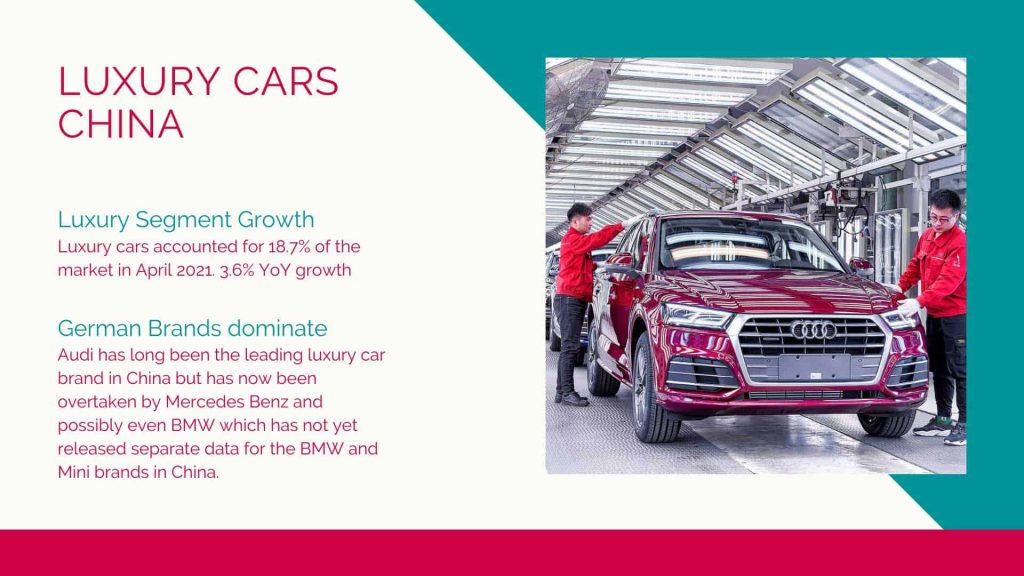
Hospitality And Travel
As mentioned earlier, Chinese luxury consumers often travel for shopping and leisure purposes, making the hospitality sector an essential part of their luxury experiences. Now, when China opened its borders, we expect that luxury consumption will recover, as Chinese consumers will go back to visiting luxury stores abroad and will be eager to purchase luxury goods while traveling.
Additionally, some renowned brands within the luxury industry have expanded into the travel sector to further enhance their customers’ experiences. For example, Louis Vuitton has recently entered into the hotel business with its flagship property in Shanghai.
Overall, it’s safe to say that hospitality and travel are closely intertwined with different sectors of the Chinese luxury market.
Effective Marketing And Sales Tactics For The Chinese Luxury Market
In this section, I will discuss the top strategies for successfully entering and thriving in the Chinese luxury market, including website optimization, social media tactics, influencer marketing, and more.
Brand Positioning And Messaging
Effective brand positioning and messaging are crucial to success in the Chinese market. This means understanding Chinese consumer behavior and preferences, as well as adapting branding strategies accordingly.
One way to maintain a strong brand position is through targeted promotion tactics. By focusing on key opinion leaders (KOLs) and key opinion customers (KOCs), luxury brands can effectively reach target audiences in China through influencer marketing campaigns.
It’s important to note that different sectors of the luxury market may require unique messaging and promotion strategies to ensure differentiation from competitors but still remain within cultural norms.
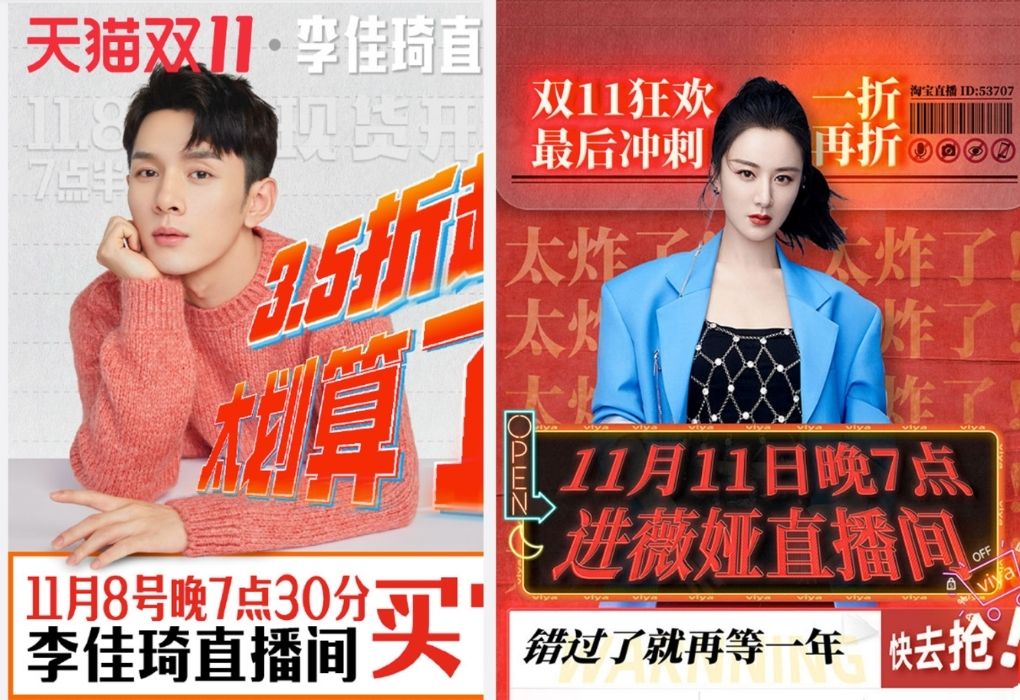
Chinese Website And Baidu SEO Optimization
While Google may be the dominant search engine worldwide, Baidu holds a 70% share of China’s search market. This means, that it’s crucial to have a Chinese website hosted in China so that Chinese internet users will be able to find you on Baidu.
To optimize your website for Baidu SEO, it’s important to conduct thorough keyword research using Mandarin keywords relevant to your brand and industry. Apart from that, you also need to make sure your website is hosted in China and is optimized for the Chinese audience regarding the content and design.
One example of the effective use of Chinese websites and Baidu SEO optimization comes from Cartier. The French luxury jeweler utilized precise keyword targeting and optimized site speed to achieve strong visibility across key searches related to jewelry in China.
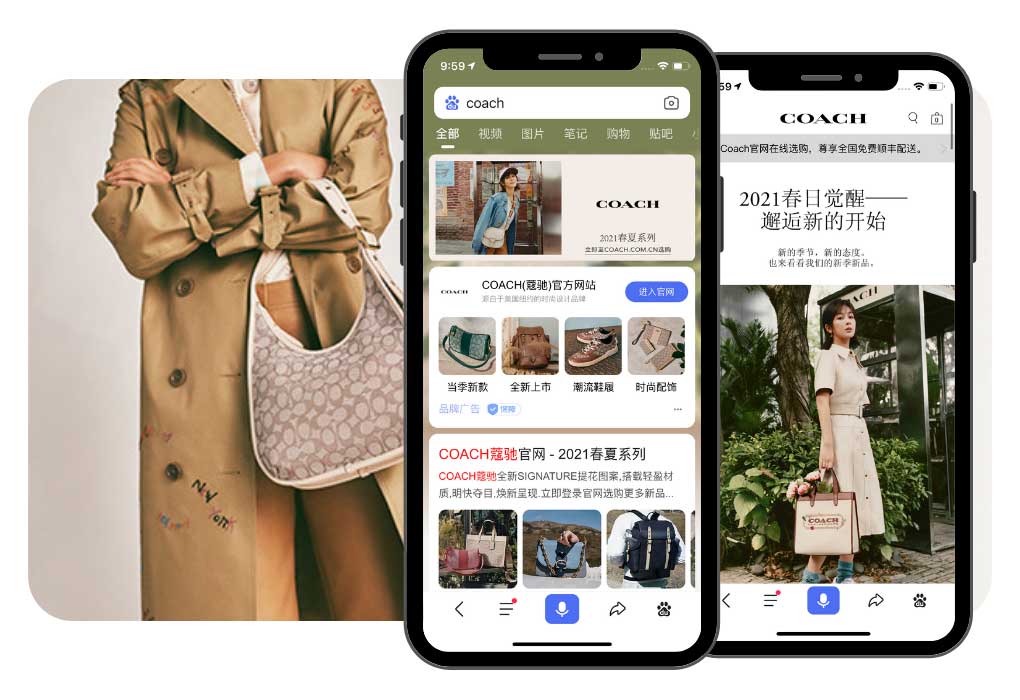
Leveraging Chinese Social Media Platforms
Although a Chinese website is needed for credibility and SEO, social media platforms are where you will build your branding and gain good e-reputation. Here are some ways to leverage Chinese social media platforms for effective marketing and sales in the luxury market:
1. WeChat Marketing: With over one billion active users, WeChat offers a diverse range of features such as messaging, blogging, direct communication with brands, e-commerce opportunities, as well as online payment options like WeChat Pay.
2. Sina Weibo Advertising: With 580 million monthly active users, Sina Weibo has become a popular platform for luxury brands to reach targeted audiences through paid advertising.
3. Douyin (TikTok) Influencer Marketing: As one of the fastest-growing social media platforms in China with over 600 million daily active users, Douyin (also known as TikTok) presents ample opportunities for luxury brands to collaborate with influencers and create engaging content to appeal to younger generations.
4. O2O Strategies: By integrating online-to-offline strategies, luxury brands can customize experiences for their customers and make shopping seamless by providing them with an omnichannel experience that reaches them wherever they may be.
5. Live-streaming: live streaming is one of the hottest marketing tactics from last years and it’s definitely not slowing down. There are many platforms to choose from and it’s a great way to collaborate with influencers and drive direct sales.
Overall, Chinese social media platforms provide ample opportunities for luxury brands in the region that aim at connecting with consumers across every touchpoint along the path to purchase – from discovery to decision-making – by enabling data-driven insights throughout their consumer journey.

Influencer Marketing
Influencer or KOL (Key Opinion Leader) marketing is an effective tactic that many luxury brands in China are utilizing to reach their target audience. Chinese consumers place a high value on the opinions of influencers, particularly those with large followings on social media platforms like WeChat and Weibo.
By partnering with these influencers, luxury brands can tap into their massive audiences and build strong relationships with potential customers.
Additionally, influencer marketing allows for more creative approaches to brand promotion as it offers the opportunity to showcase products in unique ways through entertaining content such as short films or live streams.
For instance, during the pandemic lockdowns, Louis Vuitton collaborated with cultural influencers to create a “me-time” series that helped people stay entertained and engaged while stuck indoors.
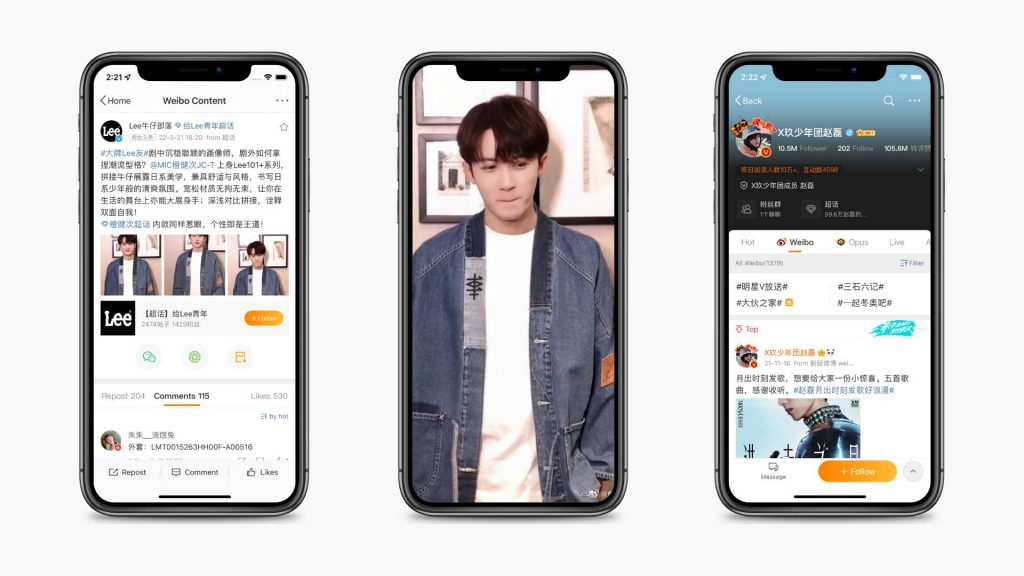
Event Marketing, Metaverse, And O2O Strategies
By hosting events such as fashion shows, product launches, or partnering with cultural institutions has proven to be successful for many luxury brands in China. Metaverse technology takes this one step further by allowing consumers to create digital avatars and explore virtual worlds where they can engage with luxury brands in new ways.
O2O strategies bridge the gap between online and offline channels through initiatives like buy-online-pick-up-in-store services or interactive pop-up shops that blend unique physical spaces with personalized digital elements.
The combined use of these tactics allows brands to leverage multichannel communication platforms effectively and maintain strong community engagement while achieving high conversion rates from social media channels into actual sales transactions.
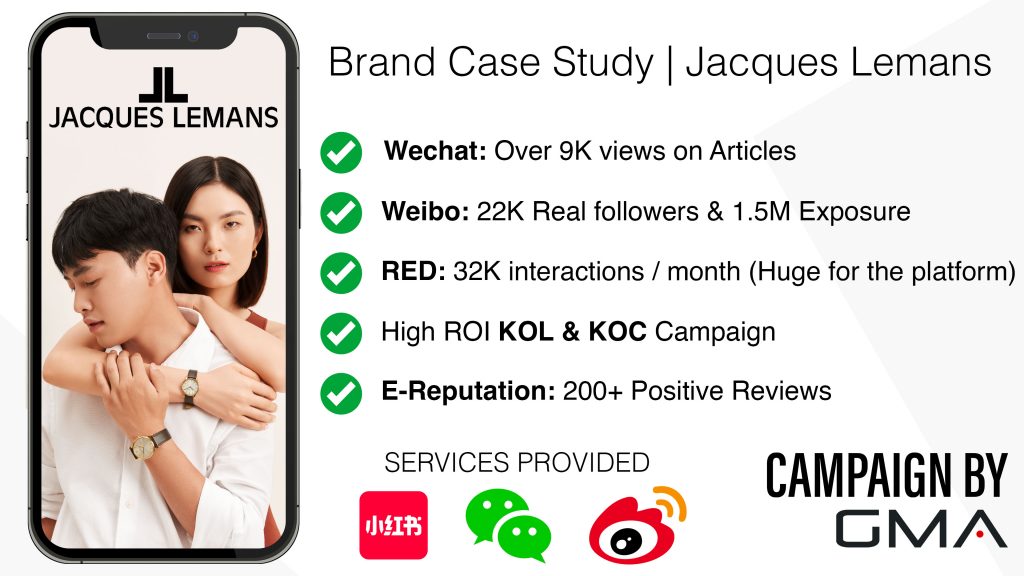
Localization And Cultural Sensitivity
Understanding the uniqueness of the Chinese market can help international brands avoid potential cultural pitfalls and create campaigns that resonate with local consumers.
For instance, savvy players such as Louis Vuitton have established themselves in China by leveraging local celebrities and key opinion leaders (KOLs) to endorse their products through localized branding collaborations that cater to the specific tastes of Chinese customers.
Luxury brands should also bear in mind the importance of observing significant events like Lunar New Year or National Day since it is essential for brand awareness & engagement which drives purchasing power from loyal customers.
Overall success is determined by an understanding of unique features present within different regions hence Localizing website content via optimized keywords & local e-commerce platforms showcase dedication toward serving Chinese consumers’ needs while building trust among prospective buyers.
We Can Help You Enter China Luxury Market Today!
To successfully enter the Chinese luxury market, brands must understand the unique consumer behaviors and preferences of Chinese consumers, utilize effective marketing tactics such as leveraging social media platforms and influencer marketing, and prioritize localization and cultural sensitivity.

As China continues to play a larger role on the global stage, it is expected that its influence on the luxury industry will only continue to grow. With Chinese consumers already accounting for around one-third of global spending on high-end products, brands that can effectively tap into this market stand to reap significant rewards.
We are a China-based digital marketing agency with over 10 years of experience. During this time, our Chinese and foreign experts helped over 600 brands succeed in the Chinese market. The growth of the luxury market in Greater China is inevitable and it’s right about the time you join!
We offer many services, including:
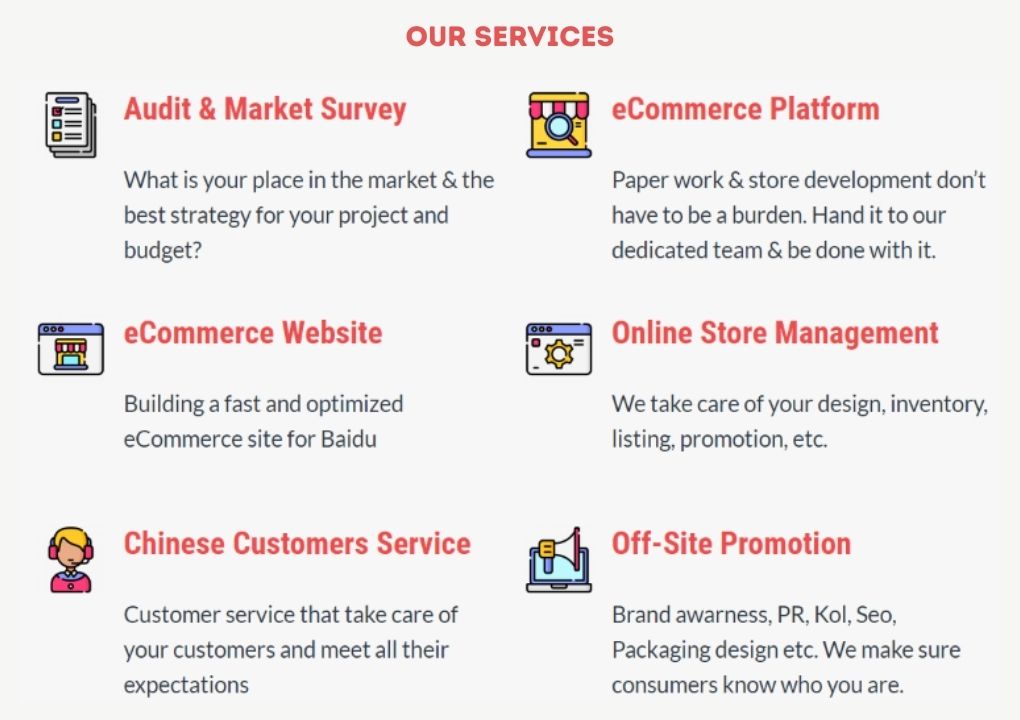
But our offer always depends on your brand’s needs, sector, goals, and budget. Don’t hesitate to leave us a comment or contact us, so that we can schedule a free consultation and get to know you better!
